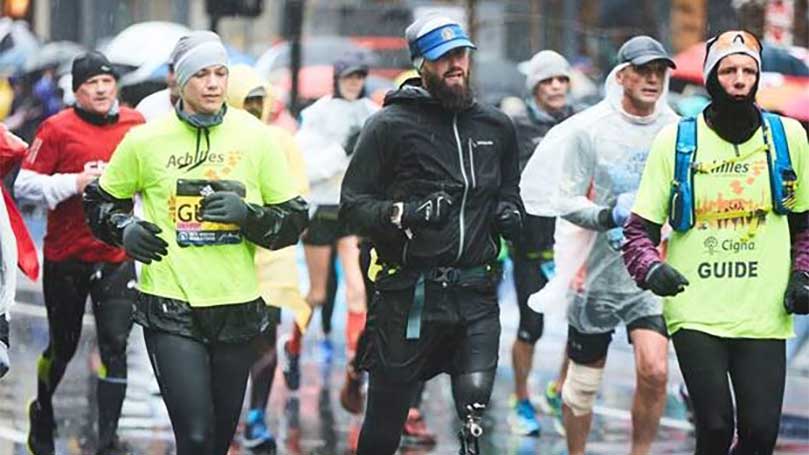
For the 30,000+ participating each year1, the Boston Marathon is more than a race: simply qualifying is an achievement, with only 10.4 percent of marathon finishers nationwide achieving a BQ (“Boston Qualifying”) time.2 Smaller still is the number of people with a disability who race against the odds in Boston each year.
Since 2004, Achilles International and its Freedom team have empowered wounded military personnel and veterans to participate in mainstream running to promote personal achievement, build confidence, and create a supportive community. And since 2008, Cigna team members have had the privilege of racing alongside these athletes as guides, helping clear cluttered water cups out of their path to avoid falls, keeping them hydrated, and even running with an Allen wrench on them to fix prosthetics mid-race if needed. Above all, Cigna guides also provide the emotional support these athletes so often rely on to achieve their race goals.
This Patriots’ Day, we’re cheering on these four Achilles athletes from the Freedom Team as they race in the 123rd Boston Marathon:
Army Specialist Stefan LeRoy
Stefan LeRoy is no stranger to racing: despite losing both of his legs in combat in Afghanistan in 2012, LeRoy has become an accomplished runner, completing dozens of races across the country including triathlons and marathons. This will be the fourth time he’s competed at the Boston Marathon.
“Being disabled is a large part of my life,” LeRoy says. “I don’t want it to limit me, but it helps define who I am. Running in Boston, however, means I am undefeated.”
Master Sergeant Cedric King
Cedric King is a double-amputee former Army ranger who picked up running after a devastating 2012 wartime incident that took both of his legs. With the help of Achilles and the constant support from his Cigna family, King has completed some of the toughest races in the world, including the Marine Corps Marathon, Boston Marathon, and Ironman Triathlon.
“Completing Ironman races, triathlons, and marathons are not about receiving awards and medals,” King says. “They’re to help train my endurance for life.”3
Special Operations Staff Sergeant Freddie De Los Santos
Freddie De Los Santos was inspired to join and serve in the military after 9/11 as a special operations staff sergeant. He lost both his legs serving in Afghanistan and underwent months of physical and psychological rehabilitation before he began his hobby as a competitive athlete. To-date, De Los Santos has competed in 26 marathons while also holding a seat on Team USA’s road cycling table for Rio in 2016.
“It was part of my rehab. It became my way of life. And I love it. It has been the most rewarding experience, being able to compete despite my disability,” De Los Santos says.4
Army Staff Sergeant Tom Davis
In 2006, Tom Davis lost his left leg in Iraq when an IED blew up his Army Humvee. Today, he is racing to (hopefully) win yet another Boston Marathon in the handcycle division, competing against wounded warriors who underwent treatment and rehabilitation at the Walter Reed National Military Medical Center in Maryland alongside Boston Marathon bombing survivors.
“We compete against each other,” Davis says. “Our guys are out there competing against themselves, really. We are serious athletes.”5
These athletes prove that anything is possible and they embody what is best about the human spirit.